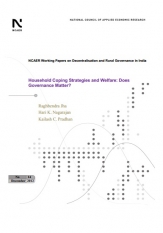Household Coping Strategies and Welfare: Does Governance Matter?
Kailash Chander Pradhan
Hari K. Nagarajan
Raghbendra Jha
December 2012
Rural households in India are often confronted by various types of risks — covariate (e.g. natural disasters, economic or political crisis) and idiosyncratic (e.g. illness or job-loss) shocks. When faced with such risks even non-poor members of society can be vulnerable if they have ineffective or constrained coping instruments. This study analyses the relationship between shock types and coping decisions of rural households, and the impact of these coping strategies on consumption using the ARIS/REDS panel survey data. We find that rural households will be more vulnerable in time of covariate shocks. Social networks help to get borrowings from friends and relatives during shocks periods. The results indicate that rural government programs contribute significantly to manage distress shocks. We find that coping strategies such as savings, getting help from the government, technological up-gradation and selling assets increase the chance of consumption growth of households. Other coping strategies such as obtaining alternative wage employment, getting help from relatives, and starvation are risky coping strategies and decline the chance of consumption growth of households.
Overall, the results suggest that shocks experienced by rural households are likely to negatively affect their future welfare and more effective social risk management strategies are needed. An important policy implication of our analysis is that the government should provide readily accessible and well targeted public safety nets. The existing informal strategy is not very effective as a consumption insurance mechanism. Although the government coping program is found to reduce vulnerability, access to such program is constrained. Expansion of government sponsored coping program is likely to protect households effectively from negative shocks.
Agriculture and Rural Development







